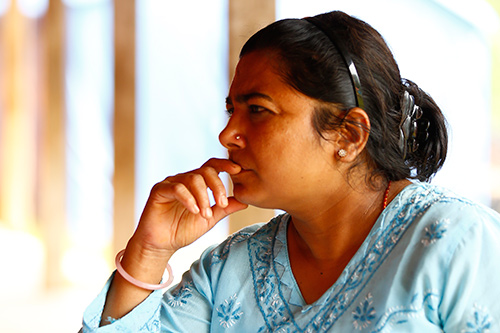News
Relief workers in Nepal race to beat monsoon rains
- 15 June 2015
News
RASUWA DISTRICT, Nepal – Ishwari Dangol spent 12 hours trying to pull her seven-year-old son from the rubble of Nepal’s massive April earthquake. She was seven months pregnant at the time, and has since struggled to access antenatal care and to cope with her son’s tragic death.
She is not alone: In the 14 worst-hit districts, more than 5 million people have been affected, including some 93,000 pregnant women. And with the monsoon season imminent, reaching women and girls in remote affected areas is becoming urgent than ever.
Mobile reproductive health camps have been deployed to provide health services in affected communities, with priority going to the most remote of the affected areas.

"This camp has services especially for pregnant women, and also offers psychosocial counselling. That's why I came here," Ms. Dangol told UNFPA at a mobile health camp in Betrawati, Rasuwa District.
"Most of the houses are gone. Many health facilities where people used to get primary treatment are devastated," said Suman Panta, a doctor at the camp, which reached more than 500 people in just three days.
"We are going to the furthest places first, the ones we won't be able to reach once the monsoon starts. We are also mentally prepared for the weather challenges ahead," Dr. Panta added.
UNFPA, in partnership with health authorities and local organizations – including the Adventist Development and Relief Agency, CARE, and the Family Planning Association of Nepal – has supported and secured funds for about 50 reproductive health camps in the 14 most-affected districts.

The camps provide a wide range of services, from antenatal and post-natal care to family planning and health education, as well as counselling that includes guidance on preventing gender-based violence. Medicine is free of charge, and adolescent-friendly spaces cater to the specific needs of young people.
Radio spots and outreach by Nepal's female community health volunteers are ensuring communities learn about the services available. Families from extremely remote areas are now clustering in places where the mobile camps can be more easily accessed, and where referrals to a district hospital can be made.
UNFPA, working with district health offices and local NGOs, is also providing reproductive health kits to local health personnel. These kits contain the supplies needed to provide reproductive health services for various population sizes over a three-month period.
The kits can support antenatal and post-natal care, safe childbirth – even Caesarean section –family planning, management of miscarriage, prevention and treatment of sexually-transmitted infections, and post-rape treatment.

“Ultimately, these kits help reduce maternal mortality and morbidity, which is a priority for Nepal,” said Kabita Balami, a staff nurse at the camp.
UNFPA has also distributed clean delivery kits, which containing a razor blade, cord clamp, soap, sterile plastic sheet, gloves and other supplies, designed for women who give birth before they are able to reach a health facility.
"We always encourage transfer to local hospitals and health facilities for assisted deliveries," explained Dr. Panta, "but in case they don't make it in time, the clean delivery kits can help ensure a safe delivery at home or in a camp or temporary shelter for displaced people."
The earthquake has been particularly gruelling for pregnant women, with many worrying about the impact it may have on their pregnancies.

"Many people were talking about how the earthquake would cause premature deliveries," said Sushila Acharya, 19, at the Betrawati health camp. "I am nervous for my baby."
"The earthquake has brought out a lot of issues for the women here," explained Monika Devkota, a counsellor at the camp. "Many are experiencing flashbacks to earlier traumas, or suffer from severe anxiety and grief from losing loved ones. This impacts their well-being and the health of their baby, so these sessions are essential."
Ms. Devkota flagged six cases as ‘critical’ in just one day at the Betrawati camp. Ms. Dangol was one of them.
Measures have been put in place to ensure follow-up support.
–Nicole Foster